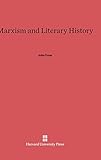Marxism and Literary History / John Frow.
Material type: TextPublisher: Cambridge, MA : Harvard University Press, [2013]Copyright date: ©1986Edition: Reprint 2014Description: 1 online resource (275 p.) : illustrationsContent type:
TextPublisher: Cambridge, MA : Harvard University Press, [2013]Copyright date: ©1986Edition: Reprint 2014Description: 1 online resource (275 p.) : illustrationsContent type: - 9780674332805
- 9780674332812
- Critique marxiste
- Crítica
- Discours littéraire
- Discourse analysis, Literary
- Literatur, Rhetorik, Literaturwissenschaft
- Marxist criticism
- Discourse analysis, Literary
- LITERARY CRITICISM / General
- LITERARY CRITICISM / Russian & Former Soviet Union
- Marxist criticism
- POLITICAL SCIENCE / Political Ideologies / Communism, Post-Communism & Socialism
- LITERARY CRITICISM / General
- 808/.00141
- P302.5
- online - DeGruyter
| Item type | Current library | Call number | URL | Status | Notes | Barcode | |
|---|---|---|---|---|---|---|---|
 eBook
eBook
|
Biblioteca "Angelicum" Pont. Univ. S.Tommaso d'Aquino Nuvola online | online - DeGruyter (Browse shelf(Opens below)) | Online access | Not for loan (Accesso limitato) | Accesso per gli utenti autorizzati / Access for authorized users | (dgr)9780674332812 |
Frontmatter -- Preface -- Contents -- A NOTE ON TRANSLATIONS -- 1 Introduction -- 2 Marxism and Structuralism -- 3 Discourse and Power -- 4 Russian Formalism and the Concept of Literary System -- 5 For a Literary History -- 6 Intertextuality -- 7 Text and System -- 8 Limits: The Politics of Reading -- Notes -- Index
restricted access online access with authorization star
http://purl.org/coar/access_right/c_16ec
John Frow's book is a novel contribution to Marxist literary theory, proposing a reconciliation of formalism and historicism in order to establish the basis for a new literary history. Through a critique of his forerunners in Marxist theory (the historicist Marxism of Lukács, the work of Macherey, Eagleton, and Jameson), Frow seeks to define the strengths and the limitations of this tradition and then to extend its possibilities in a radical reworking of the concept of discourse. He develops the notion of literature as a historically specific system within a network of discourses. Frow goes on to elaborate a number of central theoretical categories and to explore the historical dimension of those categories. Drawing in particular on Russian Formalism, he develops a theory of the dynamics of literary change and of the historical pressures that shape the literary system. He tests and extends his categories through readings of texts by Petronius, Hölderlin, DeLillo, Dickens, Frank Hardy, and others. The final chapter, a reading of Derrida and Foucault, poses the question of the possibility of setting limits to reading and the power of limits to determine literary history.
Mode of access: Internet via World Wide Web.
In English.
Description based on online resource; title from PDF title page (publisher's Web site, viewed 24. Aug 2021)


